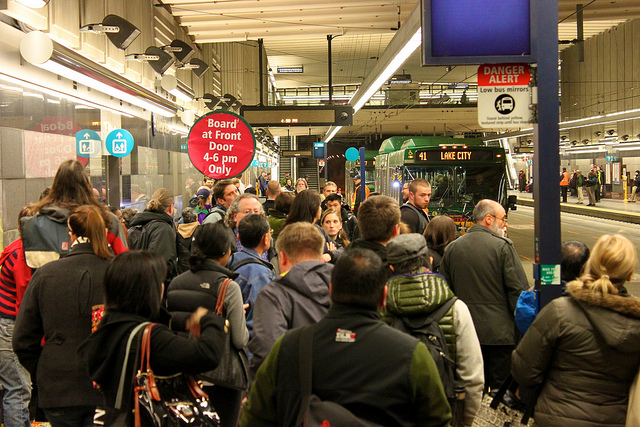In blocking a vote on a transportation package before the Washington State Legislature adjourned this weekend, Senate Republicans led by Rodney Tom utterly failed anyone who rides the bus—or drives through or around—King County. There was plenty not to like about the transportation bill, but one important piece would have given King County Metro the option of raising new and needed revenue through a local motor vehicle excise tax.
Now that that’s dead, the agency plans to go about systematically cutting up to 17 percent of its service hours over the next two years. Just think about that. It is, quite plainly, insane. For a region with employers eager to attract car-averse Millennials or who depend on service workers who travel from cheaper and more diverse suburbs, such deep transit cuts will disrupt business as usual and make it impossible for some of those employees to keep their jobs.
And who imagines the city of Seattle can come close to meeting its climate goals (like becoming carbon neutral by 2050) if we not only stop making investments in services that get cars off the road, but actively start dismantling that system at a time when we should be expanding it just to keep up with population growth?
So what’s now on the table to help backfill Metro’s immediate $75 million budget hole? Eliminating roughly one-third of Metro’s routes and reducing service on another 40 percent of routes. The remaining one-third of high-volume routes that don’t get cut will become more crowded. These cuts will be painful for the vast majority of people who rely on Metro. And for those who don’t, now your roads will be clogged with cars driven by people who once took the bus but gave up on it because it either never comes anymore or is too crowded when it does. I’ve directed people to this neighborhood-by-neighborhood map outlining the potential cuts before, but I’ll do it again, because it’s astonishing.
Tom et al. say they’ll work on an alternative transportation package to put before state voters in the fall of 2014 (which presumably might contain new funding for Metro in order to convince King County voters here to support all the other terrible ideas in it). But by then Metro will already be well into the process of identifying and eliminating routes and service.
So get ready, King County. This is what happens when the state’s voters eliminate stable funding sources for important services. Let’s see how we like it.


Comments are closed.